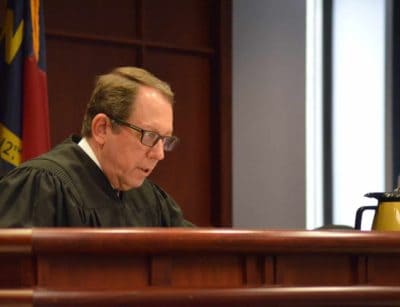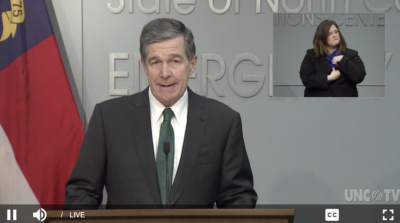|
|
Judge David Lee signed Monday an order to implement a comprehensive eight-year plan to meet the state’s constitutional obligation to provide the opportunity for a sound, basic education to all of the state’s students.
The question now is whether lawmakers will do anything about it.
“If the State fails to implement actions described in the Comprehensive Remedial Plan …’it will then be the duty of this Court to enter a judgment granting declaratory relief and such other relief as needed to correct the wrong,'” the order stated.
The move came just one day before a pair of Democratic lawmakers held a virtual town hall with education stakeholders about the importance of their plans to help the state meet the needs laid out in Leandro.
Rep. Julie von Haefen, D-Wake, and Rep. Cynthia Ball, D-Wake, are both sponsors of House Bill 946: “Sound Basic Education for Every Child,” which would fund the first two years of a comprehensive remedial eight-year plan.
The Supreme Court of North Carolina, in its landmark Leandro v. State of North Carolina decision, affirmed the fundamental right of every child to have access to a sound, basic education. The courts also ruled that North Carolina was not meeting this constitutional requirement. The courts and parties have been trying to figure out how to make this right ever since — the comprehensive remedial plan is the most ambitious attempt made yet to do so.
Von Haefen said during her opening remarks at the town hall that the bill she and her Democratic colleagues have filed is the first time there is “comprehensive” legislation that gives the General Assembly a clear way to comply with the mandates in the Leandro case.
“It’s not a choice. It’s not a difference of opinion. It’s not just a constitutional obligation, but a moral obligation,” she said.
The legislation has been sent to the House rules committee, which is a sign the bill isn’t likely to be taken up by the Republican majority in the chamber. Neither Republicans in the House nor Senate have given any indication they intend to follow the outline of the comprehensive plan.
At one point in the virtual town hall, the question of what would happen if lawmakers didn’t move forward with the comprehensive plan came up. One of the panelists, Alex Evans, an attorney with Disability Rights NC, said it could be bad.
“If the legislative branch refuses, we’re kind of at a constitutional crisis,” he said.
He talked about Brown v. Board of Education and how despite the fact that the Supreme Court ordered schools to integrate, it still took forever for implementation to happen.
The order signed by Lee mentions the House Democrat’s bill, as well as the Governor’s budget, both of which take efforts to implement the first two years of the comprehensive plan.


“The Court has granted ‘every reasonable deference’ to the legislative and executive branches to ‘establish’ and ‘administer a system that provides the children of the various school districts of the state a sound basic education,'” the order states.
While Ball and von Haefen hosted the town hall on Leandro, the featured guests were three education stakeholders who talked about the importance of both the legislation and the comprehensive plan in the Leandro case.
Jackie McLean, a dropout prevention specialist in Hoke County Schools, said that while her district might not be as big as Wake or Guilford, it is important.
“We are the birthplace of Leandro, and yes, we are waiting for the full development of this baby,” she said.
She talked about the struggle she and her colleagues have had during COVID-19, making home visits to students who drifted away and seeing the mental and emotional distress, food instability, and sometimes even abuse that these students are facing.
She said she and her colleagues know how important it is that they meet the needs of their students.
“What you feed grows, and what you starve dies,” she said.
She said districts like hers need funding to ensure the continuity of care that students need. She talked about a woman who dropped out — a mother who was already working by the time McLean found her. The woman told McLean that she had sent numerous emails to the person in the school district whose job it was to help her, but she didn’t get a response.
“I didn’t drop out on the school,” McLean recalls the former student saying. “I had to get a job because school dropped out on me.”
McLean said there is nothing worse than waiting year after year for legislation and budgets that prioritize education the way it needs to be. She said attracting and retaining qualified teachers is difficult with salaries as low as they are, and this is particularly a problem in Hoke County, which doesn’t have the money to supplement the funds that come from the state.


“We advocate home-grown in Hoke County, but there is no incentive for them to return, because they are aware that we are Leandro and nothing has been done,” she said.
She said that all the social workers and dropout prevention folks in her county are serving at least two schools each. The high school has four academic counselors, each with a caseload of 400 or more students. Funding from the Leandro legislation could help with this as well as teacher recruitment and retention. But even without it, she said the district has continued to see growth in its graduation rates and declines in its dropout rates since 2008.
Regardless of the challenges, she said she and her colleagues “press forward in our mission to serve the whole child.”
Evans said the fights for disability and racial justice are linked, though people often act like they’re separate when it comes to public schools.
He said Black students with disabilities disproportionately make up a large percentage of all suspensions and expulsions. He said that is due to many factors, but two of them are white supremacy and anti-Blackness.
Students with disabilities need specially designed instruction to meet their needs, Evans said, including smaller classes and additional resources. He said that so do students from economically disadvantaged backgrounds, who need additional resources and help to do as well as their peers from more affluent households.
“Leandro established that the North Carolina constitution guarantees all students the opportunity for a sound, basic education. This includes students with disabilities,” he said, adding later, “North Carolina’s funding system must prioritize higher-needs students, including students with disabilities.”
Among the things Evans said the state needs are more resources for lower-performing schools and districts, the elimination of the cap on special education funding, and more resources given to early childhood education, all items addressed to some degree by the Leandro legislation that was the focus of the town hall. The last item is something his fellow panelist Elaine Zukerman talked about at length.


Zukerman is the advocacy and communications director at the NC Early Education Coalition, and she said that North Carolina has long been a leader in early childhood education with highly-effective programs like NC Pre-K and Smart Start. But that doesn’t mean the state is giving early childhood its due, she said.
“These programs and others like them have been continuously underfunded for decades,” she said.
She said child care in the state and country is both hard to find and difficult to afford. North Carolina is considered a child care desert, she said, with five children for every one spot in a licensed child care program.
“If you do manage to find a spot, the cost is out of reach,” she said. “A year of child care costs more than a year of public college tuition.”
NC Pre-K and child care subsidy assistance help with this, but she said that at current funding, the state is only serving about 15% of all eligible children. The Leandro legislation filed by von Haefen and her colleagues would expand NC Pre-K and increase child care subsidies, among other things.
She said that a free market approach to child care isn’t working. Child care operations are private businesses operating on tiny margins.
“Child care programs that are struggling don’t have the option to raise tuition because parents just can’t afford it,” she said.
She also talked about how low the pay is for child care workers, who are mostly women of color making an average of $12 an hour. Because of that, not only is the child care workforce relatively small, she said, but people don’t want to go into the field.
“We not only have an acute workforce shortage, we also don’t have any pipeline of early childhood educators.”
Next steps
Defendants have to submit a progress report on “fulfilling the terms and conditions of this Order” by Aug. 6. The court will hold a hearing on Sept. 8 at 11 a.m. “to address issues raised in that report and any response from Plaintiffs.” Before Oct. 31 and at the end of every subsequent quarter, defendants have to submit progress reports to the court.
Below, see implementation cost tables for the comprehensive plan the court has ordered.





